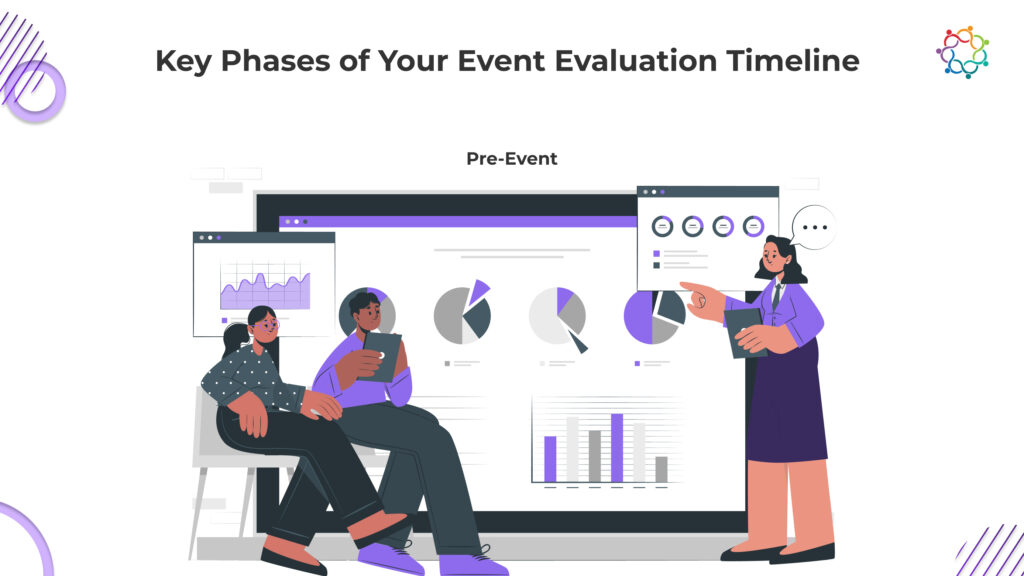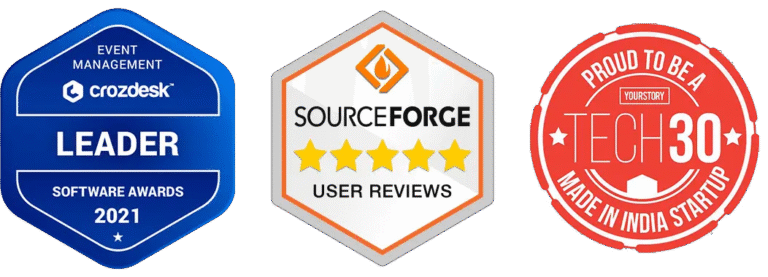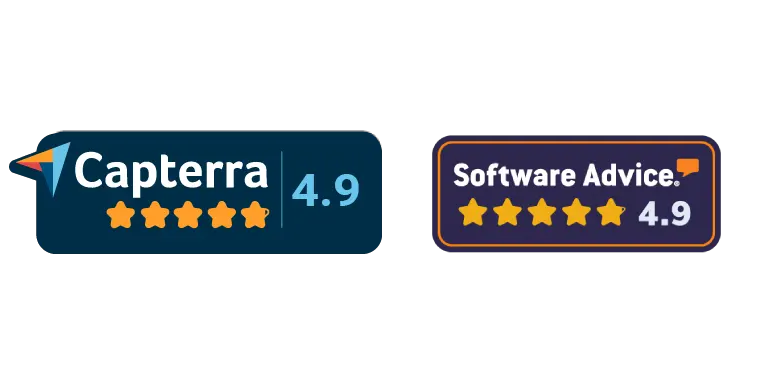Samaaro + Your CRM: Zero Integration Fee for Annual Sign-Ups Until 30 June, 2025
- 00Days
- 00Hrs
- 00Min

Have you ever found yourself asking whether your event really hit the target?
Or do you walk away with important information left on the table after exhibiting booths are taken down and lights are off?
For many event organizers event evaluation is considered a secondary activity, something to be part of a post-event wrap-up, or part of a report to stakeholders. However, in today’s data-driven events zeitgeist, evaluation is not merely an option. Evaluation is a strategic leverage point to enable smarter planning, assure better execution, and yield higher ROI across your event portfolio.
And the key to capturing that value is to create an event evaluation timeline!
An evaluation timeline is not a linear post-event checklist, it is an evaluation tool to ensure that evaluation metrics, feedback, and learning are built-in to each phase of the event: before, during, and after the event is completed.
When you evaluate your event the right way, you can evaluate what matters, glean real-time insights, and transform raw data into implementable change.
In this blog, we are going to walk you through:
This blog reflects one of the shortest white papers we have written – “Expanding the Horizons of Post-Event Evaluation.” It is your complete framework on continuous event improvement from evaluation methodology to implementation. (Link at the end of the blog)
For most people, when they hear event evaluation, they think about what happens after the event. Feedback forms, post-mortems, and reporting decks. However, the short answer is that if you wait until the event is over, you have missed at least half of the story.
Smart event evaluation timelines move evaluation away from being just an end-of-event task to being ongoing throughout the event process – before we plan and after the event.
Why does this matter? Because the best evaluations come not just from the time after the event, but when you are being intentional before, during and after an event, with a timeline to support the process.
Now let’s unpack some of the benefits of having a timeline for event planning:
When you articulate your success early, you can ensure you collect the right data at the start. No second guessing, no “scrambling” at the end of every event – just clarity between your event goals and measurement strategy.
A timeline takes pressure off the chaos of the evaluation purpose and timeline. A timeline can set structure and space for the entire evaluation which increases data quality, role clarity across teams and keep ideas moving through your timeline space.
Timely data is powerful – because of the timeline you catch the insights when they are relevant, allowing you time to respond creatively in the moment and utilize them for future events.
When it comes to stakeholders, they want to see value for the organization – not just impressions or attendance, but value for the business. A timeline can even tie an outcome which allows you more confidently report and justify future spend.
Evaluation is not an activity we engage in once and leave it behind – it is a loop. A timeline can streamline evaluation to be a subset of repeatable, learnable, systems that improve in each iteration. A well thought out timeline not only helps you measure what happened, but it also helps you create a better experience through each of the steps.

If you are ready to put it into action, we will discuss the three stages of effective event evaluation timeline in the next section.
This is where you lay the foundation. Without clarity here, your entire evaluation effort can fall flat.

Define Objectives & KPIs
If you do not understand what success looks like, you cannot evaluate success. You will need to define objectives that are clear and measurable, while also connecting them with your larger business and marketing goals. Are you looking for lead generation, brand awareness, and customer education, or all three?
Data Collection Strategy
Establish what data collection is needed and how the data will be collected. This may include identifying potential data collection at any pre-event survey, behavioral data based on registration (i.e. job title, size of the company, etc.) and pre-event engagement (i.e. open rates on emails, webinar registrations, etc.)
Tool Selections
Select the platforms you will use to collect and analyze your data: survey tools, registration platforms, CRM integrations and analytics dashboards.
Roles & Responsibilities
Set clear ownership for each segment of the evaluation process by who will be monitoring live data, who will craft the reporting, and who will present takeaways to stakeholders.
The evaluation process is not on pause when an event happens – in fact, it’s the best time to gain genuine, unguarded feedback.
Live Data Collection
Collect participant behaviour and interactivity from live data: session attendance, in-app polls, booth activity, social media tagging related to your event, etc., and have a indicator of what is (or isn’t) working.
On-Site Surveys & Feedback
Use QR Codes/links, mobile applications, or tablets to engage in shorter surveys/focused feedback on-site at the event. When you gauge detailed impressions without a delay, you are capturing accuracy, or at least accuracy on what they felt/thought at the time.
Troubleshooting & Improving
You simply have the ability to see and address problems in real-time! Perhaps you see inattentive participants to a session, or social media feedback about attendees being lost in the conference center.
This is when you’ll have all the data ready to start your synthesis. However, the timing and structure matters – don’t take too long, inertia will lose its clout quickly.
Sending Surveys
Act while it’s still somewhat fresh. The longer you’ve gone, the more approach you lose. Prioritizing the follow-up survey as soon as possible (ideally in the 24-48 hour range) will give you the best follow-up rate and the best insights.
Data Consolidation
Reconciling all your data streams (registration, engagement, survey, social, sales follow-up) will help you have the big picture.
Data Analysis
Once you have your data consolidated, resist the vanity metrics, focus on the qualitative/quantitative ways your data can tell a story – attendance durations, survey comments/chat logs, etc., will tell a more complete story of trends and insight that goes beyond just sending out requests for feedback.
Report Development
Create an organized report containing not only what happened, but also why it matters and what adjustments to make next time.
Communication with Stakeholders
Share the results in customized executive summaries for leadership, marketing, sales, and event teams. Create opportunities for visual representation of information, to compare against KPIs, and call out key takeaways.
Action Planning & Implementation
Use previous learning findings and design a playbook for your next event- what do you want to replicate, what do you want to change, what do you want to avoid.
Knowledge Repository
Collect and house key learnings from your event in one central and accessible repository. This way, next time your teams can build from shared learnings and not start from scratch.
This step-by-step process provides built-in intention, integration, and actionability to your evaluation.

Up next: what to keep in mind while building your own timeline—from resources and tools to flexibility and tech.
Building an event evaluation timeline is not as simple as dumping tasks or considerations on a calendar-it is about designing a system that is realistic and adaptable and takes into consideration the unique context of the event. Be mindful of the following key considerations as you develop your timeline:
Flexibility is Key
No two events are alike, so your timeline should not be like identical. A roadshow, leadership summit, and partner mixer will have differing event objectives, audience profiles, and feedback approaches if the event is successful will see changes from event to event.
Your timeline can- and should- be a living framework, not a list or checklist to work through before and during and after the event. This is true, especially during consideration of the scale, venue, audience profile, or even unforeseen situations-like waiting for an event to begin. Building in buffer zones for analysis and approval, or policy iteration after an event.
Resources Inform your Scope
Even the best timeline can unravel overnight if it does not match up with the resources you have available. Assess your team capacity.
– Who is responsible for collecting and analysing the data from the event?
– How much time can your team realistically pick for each phase over the event cycle- prior to, during, after the event?
– How much money is budgeted for tools to seek survey results, or flyer or Operations staff time to write the survey report after?
A smaller team will need to rely on figuring out simple ways to collect evidence, automating if possible, or preformatting the report writing if the event is a repeat. A larger staffing solution- can certainly do a more granular review and add time to the analysis the process can be more complex in the analysing stage even if the event process does not change. To not overreach and to recapitalize the data, the more granular, that the whole team feels is consistent, the better.
Technology Can be a Force Multiplier
Event tech is not a luxury, or convenience- it is a necessity to evaluation efficiently. The right tools will allow you to do any of the following:
– Automated feedback with scheduled data collection from feedback, or survey, and prompt the app to share positive feedback related to the event.
– Track attendee behaviour by a mechanic that works on and offline by time or attendance in real time.
– There is even an option to gather data from an event meeting by the event platform to your CR system- something to look forward to.
– Visualize results so you can share results in different ways clearer and quicker.

Much like with the resources, use the three pillars, consider all these factors when development you use these three factors. The easier the experience with the technology, the easier it is to access data later.
In considering the last three- flexible, resources and tools or techniques- will ultimately lead you to building a timeline that is and evaluative, while at the same time, valuing both the researcher and practitioner perspectives.
Building a thoughtful event evaluation timeline is not just about crossing of an operations list, it is not less than operational- it should at the core of any real event strategy work. Only by evaluating across all phases of the event life can you move what may be surface data cells metrics to next stage insights that offer strategic insight or impact.
With the right timeline in place, your team can:
– Collect better data
– Identify what worked (and what didn’t)
– Prove ROI to stakeholders
And most importantly, improve with every event. But this blog is just the beginning.
Ready to go further?
Download our in-depth white paper:
Expanding the Horizons of Post-Event Evaluation: A Comprehensive Framework for Continuous Event Improvement
Inside, you’ll find:
– Step-by-step methodologies
– Real-world examples
– Pro-level analysis techniques
– Templates to apply right away
Take your event evaluation strategy to the next level—get the white paper now.

Built for modern marketing teams, Samaaro’s AI-powered event-tech platform helps you run events more efficiently, reduce manual work, engage attendees, capture qualified leads and gain real-time visibility into your events’ performance.
Location


© 2026 — Samaaro. All Rights Reserved.